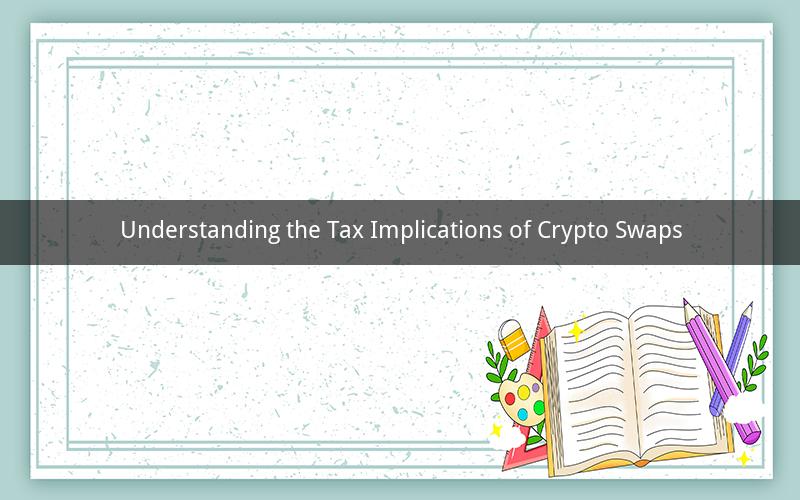
Crypto swaps have become increasingly popular in the world of digital currencies, offering users a convenient and efficient way to exchange one cryptocurrency for another. However, understanding the tax implications of these transactions can be complex and challenging. In this article, we will delve into how crypto swaps are taxed, providing insights into the various factors that can impact your tax obligations.
Taxation Basics
To understand how crypto swaps are taxed, it is essential to have a grasp of the basic principles of cryptocurrency taxation. Generally, when you engage in a crypto swap, you are deemed to have sold the cryptocurrency you are swapping out and purchased the cryptocurrency you are swapping into. This transaction is subject to capital gains tax, which varies depending on the jurisdiction and the holding period of the cryptocurrency.
1. Short-term vs. Long-term Capital Gains Tax
The tax implications of a crypto swap depend on whether the cryptocurrency you are swapping out has been held for a short period (typically less than a year) or a long period (more than a year). Short-term capital gains are taxed as ordinary income, whereas long-term capital gains are taxed at a lower rate.
2. Taxable Event
A crypto swap is considered a taxable event, meaning that you must report it to the relevant tax authority. This is done through the filing of a tax return, where you will need to provide details of the transaction, including the date of the swap, the amount of cryptocurrency swapped, and the value of the cryptocurrency at the time of the swap.
3. Taxation in Different Jurisdictions
The tax treatment of crypto swaps varies across jurisdictions. Some countries have specific tax laws governing cryptocurrency transactions, while others may not have specific provisions but may still apply general tax principles to crypto swaps. It is crucial to understand the tax regulations in your specific jurisdiction to ensure compliance.
Tax Reporting and Record Keeping
Proper tax reporting and record-keeping are essential when it comes to crypto swaps. Here are some key points to consider:
1. Cost Basis
To determine the capital gains tax liability, you need to establish the cost basis of the cryptocurrency you are swapping out. The cost basis can be the amount you paid for the cryptocurrency, including any transaction fees or other costs associated with acquiring it.
2. Fair Market Value
The value of the cryptocurrency at the time of the swap is crucial for determining your capital gains tax liability. This value can be obtained from various sources, such as cryptocurrency exchanges or valuation services.
3. Reporting Requirements
In most jurisdictions, you will need to report crypto swaps on your tax return. This may involve filling out specific forms or schedules, depending on the tax authority's requirements.
4. Record Keeping
Maintaining accurate records of your crypto swaps, including dates, amounts, and values, is essential for tax compliance. This information can be used to verify your tax return and ensure accurate calculations of capital gains tax liability.
Common Scenarios and Questions
1. How are crypto swaps taxed if I swap one cryptocurrency for another within the same exchange?
In most cases, swapping one cryptocurrency for another within the same exchange is treated as a crypto swap. You will need to report the transaction as a taxable event and calculate the capital gains tax based on the cost basis and fair market value of the cryptocurrency you are swapping out.
2. Can I avoid paying capital gains tax on crypto swaps?
While there is no direct way to avoid capital gains tax on crypto swaps, you may be able to minimize your tax liability through strategic planning, such as deferring swaps or utilizing tax-efficient investment strategies.
3. Are crypto swaps taxed differently if I use a third-party platform to facilitate the swap?
The tax treatment of crypto swaps remains the same, regardless of whether you use a third-party platform or a cryptocurrency exchange. The key factor is the nature of the transaction and the resulting capital gains.
4. How do I report crypto swaps on my tax return?
To report crypto swaps on your tax return, you will need to provide details of the transaction, including the date, amounts, and values of the cryptocurrencies involved. You may need to fill out specific forms or schedules, depending on the tax authority's requirements.
5. Can I deduct any expenses related to crypto swaps?
In most cases, you cannot deduct expenses related to crypto swaps, such as transaction fees or other costs associated with acquiring cryptocurrencies. However, some jurisdictions may offer specific deductions or tax credits for cryptocurrency-related expenses.
Conclusion
Understanding how crypto swaps are taxed is crucial for individuals engaged in digital currency transactions. By familiarizing yourself with the basic principles of cryptocurrency taxation, proper tax reporting, and record-keeping, you can ensure compliance with the tax regulations in your jurisdiction. Remember to consult a tax professional for personalized advice and guidance regarding your specific situation.